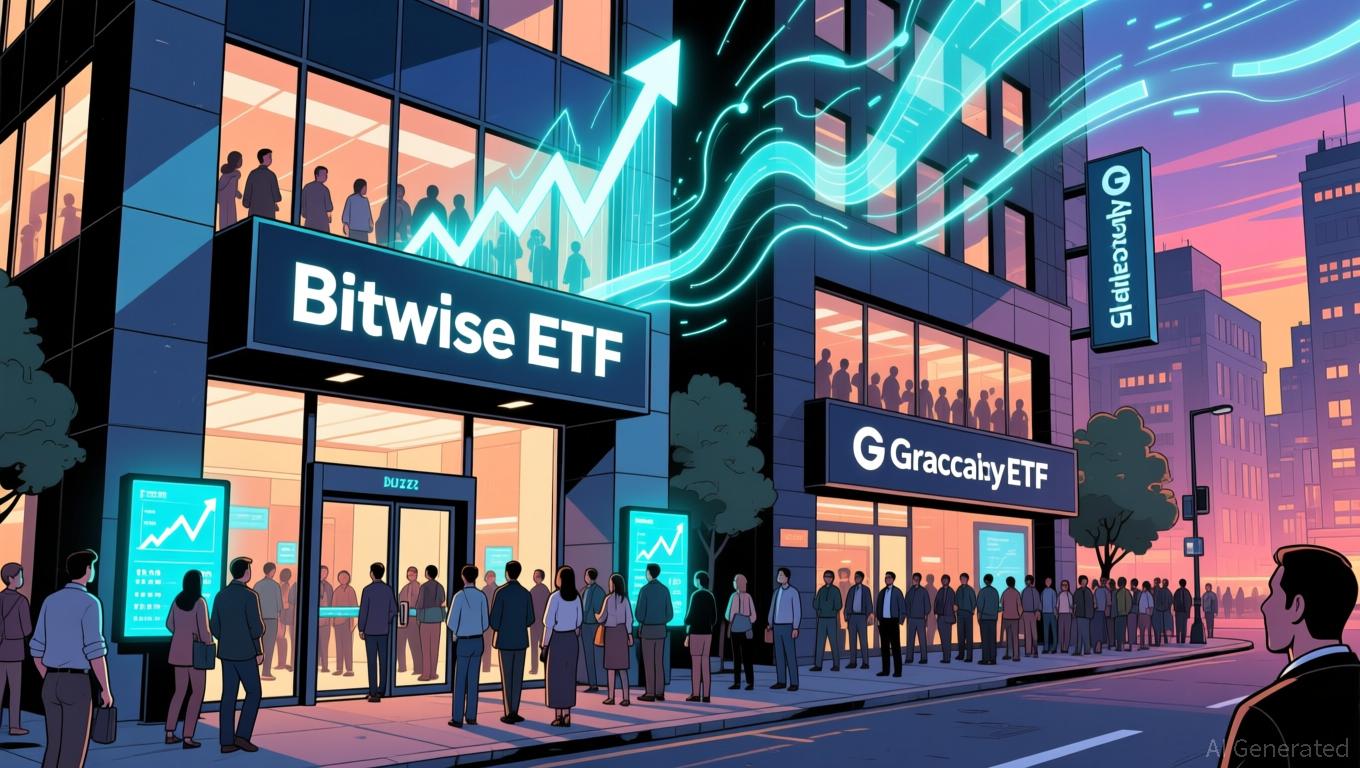Aster DEX's Adoption of Ethereum Layer 2: Driving Enhanced Liquidity and Improved Trading Performance
- Aster DEX integrates Ethereum L2 solutions to boost liquidity and trading efficiency via hybrid AMM-CEX architecture and AI routing. - Platform attracts 2M+ users and $3T+ Q3 2025 volume but faces stagnant fees and declining open interest despite 800% volume surge. - ZK Rollups adoption enables faster transactions and institutional trust, though proof generation complexity remains a deployment challenge. - Protocol updates including 300x leverage and yield-generating collateral reduced liquidation risks
Liquidity Advancements: The Hybrid Model Advantage
Following L2 integration, Aster DEX has seen liquidity improvements due to its combined AMM-CEX framework and AI-driven liquidity routing. By seamlessly pooling liquidity from both on-chain AMM sources and off-chain CEX orders, the platform addresses the ongoing issue of slippage in DeFi, all while preserving decentralization.
The platform’s unique Aster Chain, which is on track to implement zero-knowledge proofs (ZKPs), further strengthens confidence among institutional participants. ZKPs support confidential transactions and enable quicker cross-chain interactions, both vital for appealing to major liquidity providers. Moreover, targeted incentives like
Trading Performance: Protocol Enhancements and Market Response
The protocol update rolled out by Aster DEX in November 2025 marked a significant leap in trading performance. This upgrade
The impact was substantial: daily trading activity soared by 800% to reach $2 billion, and the total value locked (TVL) climbed to $1.16 billion. Nevertheless, a deeper analysis shows a gap between trading volume and fee income. Even with increased activity, protocol fees remained under $20 million, and open interest (OI) dropped to $2.669 billion. This indicates that, while the platform has succeeded in drawing in traders, it still faces obstacles in turning higher volumes into lasting revenue
Layer 2 Solutions: ZK Rollups Versus Optimistic Rollups
Although Aster DEX has not specified which L2 solution it uses, its integration aligns with the strengths of ZK Rollups. These rollups utilize cryptographic proofs to bundle transactions, providing immediate finality and reduced costs compared to Optimistic Rollups, which depend on fraud proofs and involve withdrawal waiting periods
While Optimistic Rollups are still widely adopted for their compatibility with EVM and straightforward deployment, ZK Rollups are increasingly chosen for their scalability and enhanced security. With Aster Chain’s ZKP-focused development plan, the platform is well-positioned to benefit from these advantages in the long run, even as it addresses the challenges of proof creation and implementation
Summary: Progress Achieved, Hurdles Remain
The integration of Ethereum L2 solutions by Aster DEX has clearly improved both liquidity and trading performance, elevating its status within the DeFi sector. The hybrid AMM-CEX approach, AI-based routing, and ZKP infrastructure have resolved key challenges, drawing interest from both individual and institutional participants. However, stagnant protocol fees and a drop in OI point to the necessity for new approaches to monetization.
For those considering investment, Aster DEX serves as a strong example of how L2 technologies can expand DeFi’s reach. Still, its future success will rely on finding the right balance between expansion and profitability—a central challenge for the next stage of DeFi’s growth.
Disclaimer: The content of this article solely reflects the author's opinion and does not represent the platform in any capacity. This article is not intended to serve as a reference for making investment decisions.
You may also like
Bitcoin News Update: Impact of Leverage: $215 Million in Crypto Liquidations Reveal Market’s Underlying Vulnerabilities
- Crypto markets saw $215M+ Bitcoin futures liquidations as prices plummeted below $95,000, triggering panic across digital assets. - Analysts attributed the crash to profit-taking, macroeconomic uncertainty, and leveraged long positions wiping out 77.71% of Bitcoin's liquidations. - Despite turmoil, MicroStrategy's CEO Michael Saylor reaffirmed Bitcoin bullishness, denying claims of selling holdings amid $1.8M in company stock sales. - Tether's $1B robotics investment highlighted shifting capital flows, w

Hyperliquid News Today: Trump Clashes with Greene Regarding Epstein Documents Amid Crypto's Institutional Expansion and Market Fluctuations
- Trump withdraws support for Rep. Greene over Epstein files dispute, deepening GOP fractures amid IRS chief reversal and government reopening. - AMINA AG becomes first foreign crypto bank in Hong Kong with SFC license, expanding institutional access to Bitcoin and Ethereum . - Altcoins like Stellar (XLM) and Hyperliquid (HYPE) face sharp declines due to liquidation pressures and liquidity risks in decentralized markets. - Political tensions and crypto volatility highlight divergent challenges as instituti

Solana Latest Updates: Bitwise's Solana ETF Overtakes Grayscale by Offering Staking and Reduced Fees
- Bitwise's Solana ETF (BSOL) attracted $580M in three weeks, outpacing Grayscale's $24.4M inflows for its competing fund. - BSOL's 0.20% fee and staking integration differentiate it, enabling yield generation on Solana holdings for investors. - The fund's 14-day consecutive inflows highlight institutional confidence, supported by a $222.9M seed investment versus Grayscale's $102.7M. - Growing institutional adoption of crypto-native products signals shifting investor strategies toward blockchain exposure t

PENGU Experiences a Steep 30% Price Decline Within a Week: Liquidity Disruptions and Speculative Pressure in DeFi Platforms
- PENGU's 30% price drop highlights liquidity shocks and speculative overhang in DeFi markets. - Uniswap's 2025 CCA model aims to stabilize token launches but may worsen speculation for non-CCA tokens like PENGU. - DeFi Development Corp's $112.5M funding and IO DeFi's sustainability-focused innovations reshape capital flows and investor priorities. - Protocol innovations like CCA create short-term volatility while long-term stability depends on liquidity mechanisms and environmental alignment.